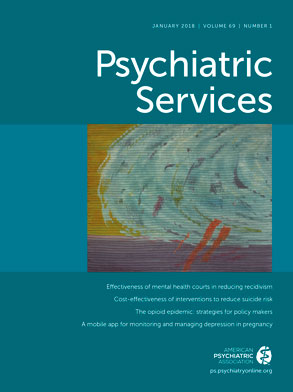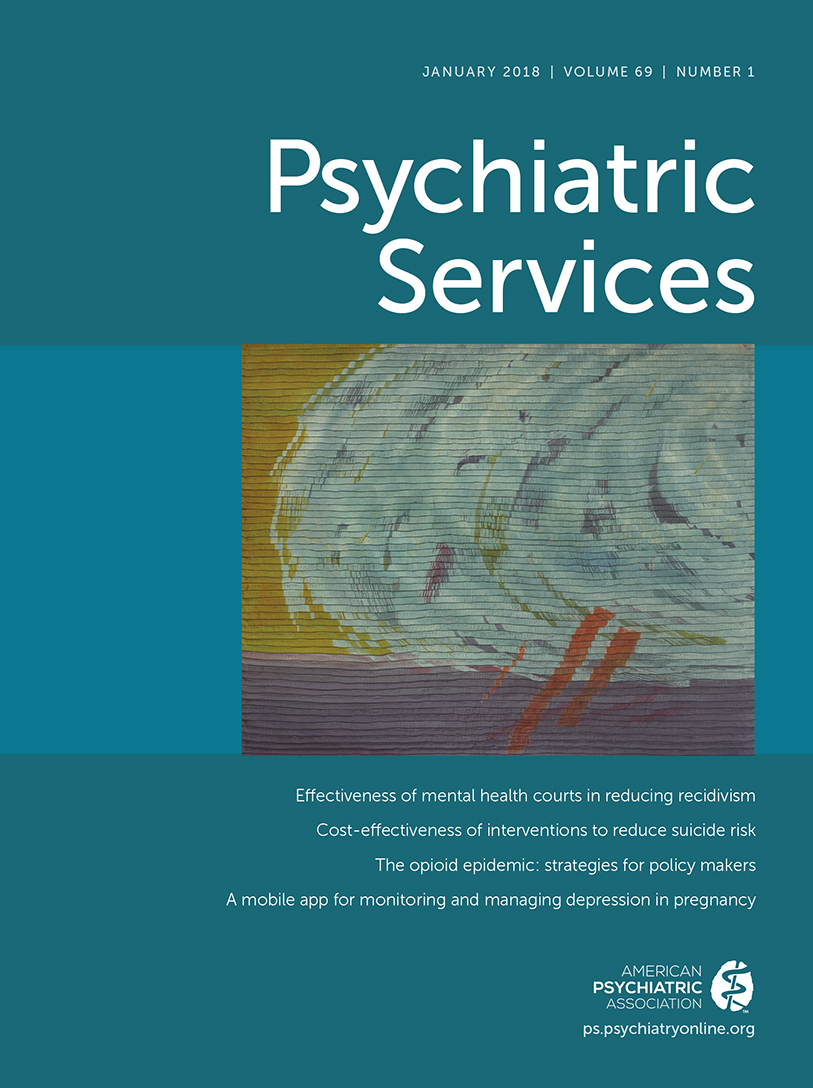Psychosis is associated with high costs and levels of disability and with difficulty achieving quality-of-life goals. International guidelines (
1,
2) indicate that medication maintenance and case management (CM) services are most effective when delivered in combination with evidence-based psychological interventions for psychosis that help clients to achieve rehabilitation goals, reduce disability, increase stability, and improve quality of life. These evidence-based therapies exist and have been demonstrated to have a positive impact on client outcomes (
3). However, such therapies are commonly developed for and delivered by only highly trained licensed therapists, who are in short supply in typical delivery systems. Consequently, implementation of appropriate evidence-based practices (EBPs) is significantly limited by shortages of staff trained—and deployed—to deliver them. Training an existing frontline workforce, who are more numerous and more widely deployed than trained therapists, to deliver such therapies has been recommended as one way of increasing implementation of such EBPs. However, whether this approach is feasible both in terms of training and implementation is unclear. In the United Kingdom, the frontline workforce typically comprises a multidisciplinary team of mainly bachelor’s-level licensed mental health professionals: mental health nurses and social workers in case and crisis management roles, licensed staff from a range of professional backgrounds without CM responsibilities (for example, occupational and vocational therapists), and clinical assistant posts or internships (bachelor’s-level psychologists in entry grades, without licenses). The teams are supported by a much smaller workforce of doctoral-level clinical psychologists and senior “consultant” psychiatrists (the ratio of doctoral-level psychologists to bachelor’s-level professionals is typically 1:20 or lower).
The GOALS Study
The GOALS Study examined the feasibility of training frontline staff from a variety of professional backgrounds, both with and without CM responsibilities, to deliver a structured, manual-assisted psychological intervention to people with psychosis. The intervention is based on evidence-based behavioral techniques of behavioral activation and graded exposure, targeting symptoms of depression and anxiety, respectively. There is strong evidence that these interventions are effective when delivered by trained psychological therapists, either as part of cognitive-behavioral therapy for psychosis, particularly in earlier therapy sessions (
3), or in the treatment of mood disorders without comorbid psychosis (
4,
5). There is also growing evidence that these interventions can be delivered by bachelor’s-level graduates to clients with mood disorders (
6), but less is known about effectiveness with clients who have comorbid psychosis.
For this study, we created an eight-session, step-by-step manual with client handouts, following the EBPs of graded exposure and behavioral activation, to target a personal recovery goal where either anxiety or depression, respectively, is a barrier to achievement. The protocol was designed specifically for people with psychosis, including reference to distressing psychotic symptoms as potential causal and maintaining factors of anxiety or depression (or both). The protocol also uses simplified language to account for the cognitive difficulties of some clients with psychosis. Key aspects of the evidence-based therapy include setting a personal recovery goal (typically around socializing, hobbies and interests, or healthy living), education on the “vicious cycles” of depression and reduced activity of anxiety and avoidance, breaking down the recovery goal into smaller steps, working together to complete the steps, and troubleshooting and developing coping strategies when difficulties arise. Staff training is just two days, in addition to regular supervision with a doctoral-level clinical psychologist. The manual and training were tested in a pilot study of 12 people with psychosis, delivered by seven frontline workers after brief training (but only a minority [two of the seven]) were in CM roles). Posttreatment, Waller et al. (
7) found improvements in activity levels, depression, negative symptoms of psychosis, and general well-being, in addition to good rates of achievement of personal goals.
Following the promising pilot results, we began a single-blind, feasibility randomized controlled trial comparing treatment as usual with the GOALS plus treatment-as-usual intervention (
8). The study aimed primarily to assess the feasibility and acceptability of the therapy and training package in different frontline workforce roles and secondarily to conduct a preliminary statistical analysis of a range of clinical outcomes (
8; Waller H, Landau S, Fornells-Ambrojo M, et al., manuscript submitted, 2017). A total of 75 participants with a diagnosis of psychosis were recruited from adult secondary care services in one United Kingdom National Health Service (NHS) Trust (
8). For the purpose of this study, feasibility of staff training and delivery of the intervention was assessed through the following quantitative and qualitative methods: the number and proportion of those completing training and later delivery of the intervention, by workforce role; semistructured interviews with staff trained in examining the acceptability of training and therapy, in addition to perceived barriers and facilitators to implementation, therapy and supervision attendance, fidelity to the treatment protocol (through scoring a sample of audiotaped recordings), and progress toward goals (through sessional ratings) for all participants assigned to receive GOALS plus treatment as usual.
Findings
Uptake of training was good, with 53 staff members attending (greater than originally planned) and a relatively even spread across staff groups (16 case managers, 19 other health professionals without CM responsibilities, and 18 graduate psychology interns and assistants). However, of those trained, only a quarter of case managers went on to deliver therapy to at least one client, in comparison to over half (53%) of those without CM responsibilities and almost three-quarters (72%) of psychology interns and graduates.
Semistructured interviews were conducted with a sample of 12 trained staff members. Interviewees delivering therapy included three case managers, two other health professionals without CM responsibilities, and one intern psychologist; interviewees trained but not delivering therapy included three case managers, two intern psychologists, and one other professional. Qualitative analysis indicated that training and therapy were unanimously seen as relevant and helpful to community clients with psychosis. All categories of staff were enthusiastic about the therapy and keen to implement it but reported time and competing workload commitments as the main barriers to later delivery of the therapy, particularly by case managers:
I think that [therapy work] gets lost a little bit because there is too much focus on just preventing relapse and keeping people safe and crisis work, rather than thinking about the whole person. [case manager 1]
It felt like a lot of what we were doing [at the time of the study] was crisis management. . . . [T]he issues that I think that the training could really have helped . . . got kind of put to the bottom of the list. [case manager 2]
Case managers tended to report using aspects of the training in a more ad hoc manner, rather than following the structured protocol. Those in CM roles who delivered therapy were more likely to have protected time away from CM responsibilities and reported being particularly enthusiastic and motivated to deliver CBT.
Among those who delivered therapy, attendance at fortnightly supervision was good, and fidelity to the treatment protocol across staff groups was high. However, there were differences between staff groups in participant attendance at therapy sessions as well as in goal attainment. Psychology graduates delivered therapy with the highest median number of therapy sessions (median=9) and the highest percentage of cases rated “sufficient therapy” (classified as five or more sessions: 83% of psychology graduates received “sufficient therapy” ratings, compared with 75% of case managers and 50% of others). In terms of goal attainment, almost three-quarters of participants achieved or partially achieved their goal. When participants had sufficient therapy, all either achieved or partially achieved their goal, regardless of who delivered the therapy, and conversely all those who made no progress toward their goal had “insufficient therapy.” These people were least likely to be seen by psychology graduates.
Discussion and Conclusions
Evidence-based psychological intervention is recommended as part of standard care for people with psychosis, but implementation may be limited by availability of staff to provide the intervention. This study therefore explored the feasibility of training frontline bachelor’s-level staff to deliver GOALS, a relatively brief, manual-supported, and evidence-based intervention. Brief training, plus ongoing supervision, appeared to be effective: staff from all professional backgrounds who, following training, went on to deliver the therapy, did this with high fidelity to the protocol. Staff consistently reported motivation to deliver therapy and associated the provision of therapy with greater satisfaction in their roles. Furthermore, individuals who had job duties or protected time that was more aligned with providing therapy delivered therapy to more individuals and did so with better outcomes. The service user participants who received therapy reported high levels of treatment satisfaction and were typically able to reach the personal goals they set during therapy (Waller H, Landau S, Fornells-Ambrojo M, et al., manuscript submitted, 2017), regardless of who delivered it.
This approach indicates that it is indeed possible to train mental health workers who are not accredited or licensed therapists to deliver brief and effective protocol- and evidence-based therapy. However, there were some notable challenges in translating training into implementation. Despite a very good uptake of the two-day training package by frontline staff, nearly half of attendees failed to take on a study participant and deliver therapy. CMs were least likely to deliver therapy, citing time and caseload pressures as the main barriers, so that other tasks—including crisis management—received higher priority, a finding common to other studies aiming to implement therapeutic changes in routine clinical practice (
9). Thus the CMs were less able to integrate the new practice into their jobs despite the explicit prior agreement of their managers, with whom the study team had proactively addressed this anticipated barrier. This finding is in accord with implementation science research findings showing that training alone, without a quality improvement framework identifying how to align organizational practice and job structure with a new clinical practice, may fail, particularly if the new practice is not a good fit with existing workflow for the practitioner.
Previous attempts to widen access to evidence-based psychological therapies for serious mental illness that employ lower-cost workers have often relied on adding therapeutic approaches to the roles of already busy CMs and have met with similar difficulties with poor implementation of therapy in routine clinical practice (
10). We suggest that improving service quality and value by widening access to psychological therapies can be successful and cost-effective but requires a realistic approach by using a workforce with roles dedicated at least in part to brief therapy delivery, along with continued supervision and routine monitoring of practice delivery and results. This service model has been successfully undertaken in the United Kingdom for patients with common mental disorders (the Improving Access to Psychological Therapies program) and shows that with appropriate training and ongoing supervision, such a workforce can comprise entry-level interns or graduate workers at relatively low cost and with similar impact on therapy effects compared with more experienced and higher-paid mental health professionals. Furthermore, the study suggests that with additional organizational supports for implementation, this intervention could be delivered cost-effectively by a wider workforce that includes frontline CMs and other categories of professional staff.
Acknowledgments
Dr. Garety acknowledges the NIHR Biomedical Research Centre, South London and Maudsley NHS Foundation Trust. The views expressed are those of the authors and not necessarily those of the NHS, the NIHR, or the United Kingdom Department of Health.

